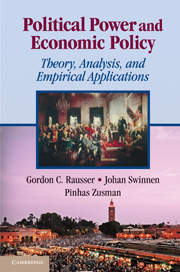Book contents
- Frontmatter
- Contents
- List of Figures
- List of Tables
- Preface
- PART 1 POLITICAL POWER AND ECONOMIC ANALYSIS
- PART 2 IDEOLOGY, PRESCRIPTION, AND POLITICAL POWER COEFFICIENTS
- 7 Political Power, Ideology, and Political Organizational Structures
- 8 Political Power, Influence, and Lobbying
- 9 Constitutional Prescription and Political Power Coefficients
- PART 3 ANALYSIS OF SPECIFIC STRUCTURES
- PART 4 EMPIRICAL APPLICATIONS OF POLITICAL POWER ESTIMATION
- References
- Index
7 - Political Power, Ideology, and Political Organizational Structures
Published online by Cambridge University Press: 05 June 2012
- Frontmatter
- Contents
- List of Figures
- List of Tables
- Preface
- PART 1 POLITICAL POWER AND ECONOMIC ANALYSIS
- PART 2 IDEOLOGY, PRESCRIPTION, AND POLITICAL POWER COEFFICIENTS
- 7 Political Power, Ideology, and Political Organizational Structures
- 8 Political Power, Influence, and Lobbying
- 9 Constitutional Prescription and Political Power Coefficients
- PART 3 ANALYSIS OF SPECIFIC STRUCTURES
- PART 4 EMPIRICAL APPLICATIONS OF POLITICAL POWER ESTIMATION
- References
- Index
Summary
Introduction
Casual empiricism and a variety of research findings offer substantial evidence of the crucial importance of participants' ideological commitments in shaping policies. In this context, an important conceptual question arises: How should the role of ideology be integrated in a political power theory of policy formation? The ideology of a group will determine its constitutional arrangements to a great extent. The constitution will set the rules for the organizational structure. As the degree and mode of interest group organization are critical elements of the political process, this aspect of our theory deserves more serious consideration.
Undoubtedly, the conduct of interest groups in the political arena depends significantly on the underlying organizational structure. Furthermore, the organizational structure of government, the conduct of politicians and administrators, as well as the behavior of political parties are principal determinants of the policy formation process and should be examined in any systematic analysis of political economics.
Attempts by economists to explain observed individual and group behavior as pursuit of pure economic gain by individual agents (Williamson 1993) have usually left a substantial part of observed behavior unexplained. Arguably, even the fundamental postulates of neoclassical markets and exchange involve a contradiction in this regard. Respect for property rights is a necessary condition for market exchange. However, full enforcement of property rights by the state is prohibitively costly unless a significant number of individuals honor the norm of “respect for the property rights of others.”
- Type
- Chapter
- Information
- Political Power and Economic PolicyTheory, Analysis, and Empirical Applications, pp. 125 - 146Publisher: Cambridge University PressPrint publication year: 2011

